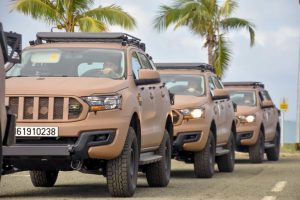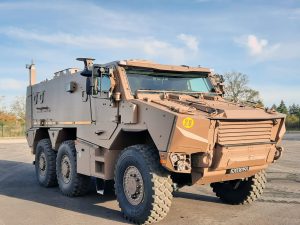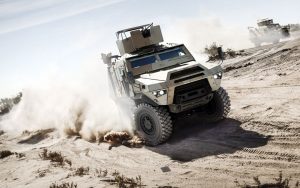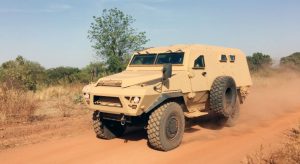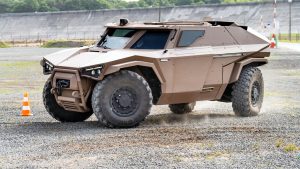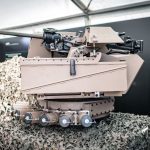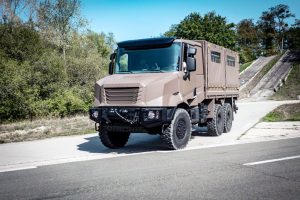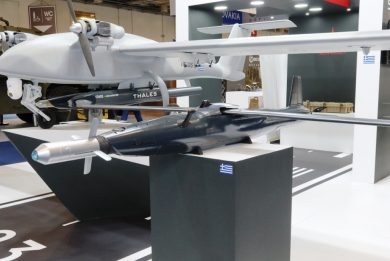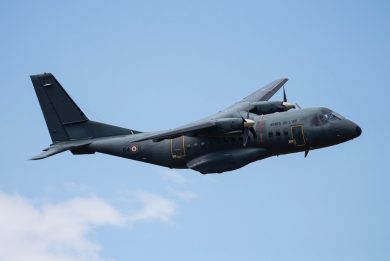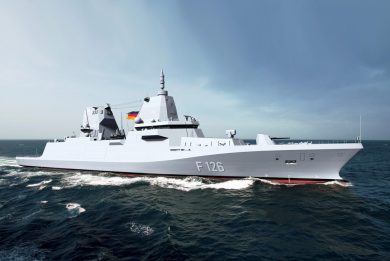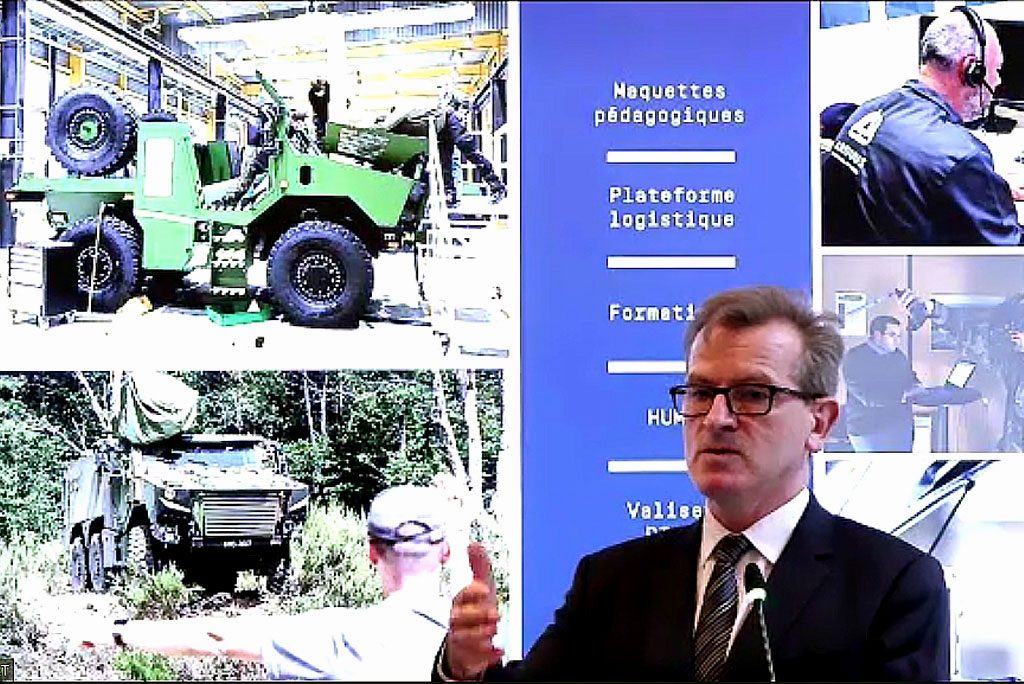
Arquus aims at one billion Euro turnover in 2030
By Paolo Valpolini
“2020 has been a difficult year, but Arquus has shown its resilience capacity, the first lockdown in spring causing a slow down in activity, which however was never stopped,” Emmanuel Levacher, the company CEO tells the audience during the annual press conference that took place in Paris on March 10th. “Once tighter protocols have been put into place, work restarted at full steam since April 6th, Arquus having delivered some 300 vehicles, new and upgraded ones, between mid-March and mid-April,” which was the most difficult period.” Even in those difficult days 35% of the personnel dealing with spare parts management remained at work, our teams ensuring on-time deliveries.
Priorities were established to get back into schedule, the first one being the French Army Scorpion programme, which included engines militarisation as well as the production of the mobility kits that Arquus provides to the company grouping, the other two partners being Nexter and Thales. The production of VT4 utility vehicles and the upgrade of VAB 4×4 armoured vehicles followed, 2020 having seen the delivery of the 2000th VT4 to French forces, the latter having been immediately deployed by the Medical Regiment that was operating in eastern France to support local medical authorities.
“We maintained a close link with our subcontractors,” Mr. Levacher adds,” not only to secure our supply chain but also to help some of them who were deeply hit by the crisis.” Notwithstanding the difficulties due to the pandemic, in 2020 Arquus continued to invest, increasing its workforce hiring 131 workers. It also shifted some work to other entities of the Volvo Group, of which Arquus is part, providing i.e. some research and development work to Renault Trucks in Lion, which allowed the company to ensure work for some 100 employees.
“During last year we delivered a total of 1,166 new vehicles, around one thousand being VT4s,” the company CEO states, “and we demonstrated that we can ensure a 95% of fleet availability to the French forces.” Forty VAB SAN C-IED were produced in 2020 by upgrading existing medical vehicles while considerably improving their protection against improvised devices. These were immediately deployed to the Sahel region, where French forces is engaged in Operation Barkhane. Furthermore a total of 508 refurbished vehicles of different types were delivered in 2020. Last year also marked an intense work in the repair of mechanical elements of older vehicles which are not part any more of Arquus portfolio but that are still supported by the company, some 2,500 such vehicles having gone through extensive repair work at the company facilities.
Due to the strain put on vehicles by military operations, the SIMT (Service Interarmées De Maintenance de l’armée de Terre, the joint land maintenance service) asked in 2020 Arquus to accelerate the maintenance and refurbishing of assets.
However 2020 was deemed to be the “Griffon year”, as the production of Scorpion-related vehicles started at full steam. “With our partners in the Scorpion programme we managed to deliver 128 Griffon as planned,” Arquus CEO says, “while the delivery of the first four Jaguar reconnaissance vehicles has been delayed to early 2021, the plan is to hand over to the French Army 20 Jaguars before year end.” Last year saw the Griffon engaged in numerous trials, air transportability, amphibious landing, mobility and firing trials in hot climate in Djibouti, and so on. Arquus is also the design authority and the producer of the remotely controlled weapon stations, TTO the French acronym, the T1 being that installed on the Griffon in the personnel carrier variant. “This was qualified by the DGA last year, and we delivered 99 of them, with good feedback from the users,” Mr. Levacher states, adding that the RCWS is the centrepiece of collaborative combat, being an effector as well as a sensor and an illumination device. “The development of such RCWS, together with the T2 and T3 that will be used on other Scorpion vehicles, led us to develop an RCWS production in France, which previously did not exist,” he adds.
During 2020 the Scorpion team qualified the Command Post of the Griffon, and in September received the contract for the second tranche of Scorpion vehicles, which includes 42 Jaguars and 271 Griffons, to be delivered in the 2022-23 timeframe. New versions are about to start testing, among which the Griffon VOA (artillery observation) and the Griffon SAN (ambulance version).
“Stepping out from the Scorpion perimeter, 2020 marked the first deployment downrange of the VT4, which was dispatched as part of the emergency aid unit dispatched to Beirut, Lebanon, to help following the explosion that destroyed the town harbour.” Last year Arquus also it’s Fortress Mk2, the upgraded version of its 4×4 vehicle, with improved protection and mobility, as well as its new line of tactical trucks known as Armis. “We also demonstrated the Areg, the Special Forces light vehicle (VLFS in French Army wording) destined to the export market, and tested new weapon systems on board its vehicles, such as MBDA’s MMP fifth generation missile on board its Sabre heavy SF vehicle (PLFS for the French Army).
“While 2020 was a good year in terms of revenues in France, the export market suffered considerably due to the lack of events where we could meet, namely defence exhibitions. That said, we completed deliveries of 300 Sherpa to Kuwait, we handed over 50 Bastion armoured vehicles and 84 tanker trucks to the G5 Sahel community and in Africa, and we exported a number of chassis and powerpacks to Indonesia, where PT Pindad is using them as base for locally produced vehicles,” Emmanuel Levacher points out.
New orders were acquired for 93 weapon carrier vehicles of different types to be equipped with MBDA and Nexter systems, Fortress vehicles were ordered by the Swedish Police special units, contracts for Bastions were inked with some African countries, and in late 2020 a contract for 300 VLRA trucks was signed with Morocco for its Army.
“While overall 2020 was a weak year, I consider however that a reduction of 10% of our turnover compared to 2019, which was a peak year, must be considered a success considering the overall situation. Of course the balance between France and export has become more unbalanced, 73% of our incomes coming from the national market, which means +23% over last year while export has gone down 50%. The other data that shows a remarkable changing is the split between MRO and manufacturing activities, the former accounting now for 42%,” Mr. Levacher said commenting his company results for last year, adding that 2021 will be the year of rebound. As for the orders backlog, the 2020 book to bill was equal to 1, slightly less than in 2019, “but as long as it is not less than 1 things are all right,” the CEO said, adding that of the 5.5 billion Euro backlog 1.3 billion is made of firm orders, while the remaining are options, most of them being quite certain to become reality.
At the end of 2020 220 Griffons had been delivered, while the plan for 2021 is to deliver 119 more such vehicles, to which Arquus contributes with mobility elements, the RCWS and logistic support. Overall the company plans to deliver 122 T1 RCWS, some initial production T2 and T3, as well as the aforementioned 20 Jaguars.
The pandemic didn’t stop the company industrial transformation, the four production sites being now specialised and adopting when applicable lean manufacturing processes. Saint Nazaire has become the centre of excellence for MRO, Marolles the CE for engine militarisation and mechanical elements repair, Garchizy for armoured hulls production and for spare parts distribution, and finally Limoges for new vehicles production.
At IDEX 2021 two major first took place. On one hand the public launch of the Scarabee, which has now become a fully-fledged product, being proposed to the export market as well as in France. EDR On-Line recently interviewed the Product Manager, to read that article please click HERE.
At that same exhibition Arquus announced the creation of the Hornet Business Unit, devoted to develop and commercialise the company RCWS. Here too EDR On-Line interviewed the new BU Director, to read that article please click HERE.
At virtual Eurosatory Arquus announced a new family of tactical trucks, named Armis, the 6×6 having been unveiled at the Arquus days in October last year. “It is a 100% French product,” said Joan Gibert, the Product Manager of that line of business. “We are of course looking at the needs of the French Army, but we also designed them considering the needs of the international market,” she added, underlining how much that product leverages the capabilities of the Volvo group, which allows Arquus to take the best from the commercial line, installing it on a military architecture, to produce high standard trucks at a cost-effective rate. “We await eagerly the specifications of the French Armed Forces,” she concluded.
Mr. Levacher announced that the company is already working on another project: “We are working on a concept for the MAC (Module d’Appui au Contact), the engineer vehicle that will replace a number of specialised vehicles currently in service with the French sappers. We will compete for that bid, and we will partner with some French industry, although we will also exploit the know-how and assets of Volvo Construction Equipment, the Volvo group company devoted to construction equipment,” he announced. The company is also looking at the replacement contract for the VBRG (Véhicule Blindé à Roues de la Gendarmerie), the new vehicle being named VBMO (Véhicule Blindé de Maintien de l’Ordre), for which Arquus will present the Sherpa in an evolved version, the vehicle featuring a high transport capacity and being quite discreet, according to the CEO, who stated that the company will find a partner for that bid, the vehicle being fitted with a dozer blade.
Innovation will be key for maintaining the momentum. As Christian Jacques, the company Innovation Director, said, the company must continuously evolve its products to cope with the changing military environment, lessons learned by French forces during its missions downrange being key for having first hand information. “Our strategic priorities are energy, survivability, robotisation and digitisation,” he said, adding that the work being done within the Volvo group in terms of hybrid propulsion, and now also on hydrogen propulsion, give an edge to Arquus that can exploit those developments to adapt them to the military. The company invested in R&D in the protection area, considering not only physical protection against enemy threats but also stealthness and the capacity to early detect the enemy. Dealing with robotisation, here too Arquus benefits of the R&D done within the group, mainly by the Volvo Autonomous Solutions BU. That said military differs from commercial application, thus Arquus has set up a Robot-Lab where it works at proprietary solutions in the field of follow-me and tele-operated solutions, also looking at “Mission Extenders” in the form of unmanned systems deployed from manned vehicles. As for digitisation, this is of course used on board vehicles, the Battlenet vetronica architecture being installed on most company vehicles, while it is also heavily used for training and maintenance purposes.
Closing the press conference Emmanuel Levacher, Arquus CEO, launched three challenges for the next years. “We aim to reach a turnover of one billion Euro by 2030, with a 5% increase per year,” he said, adding that the other two objectives are a split of 50/50 between the national and the export market, half of the latter possibly in Europe, an even split being also sought between vehicles production and services.
Photos courtesy Arquus

